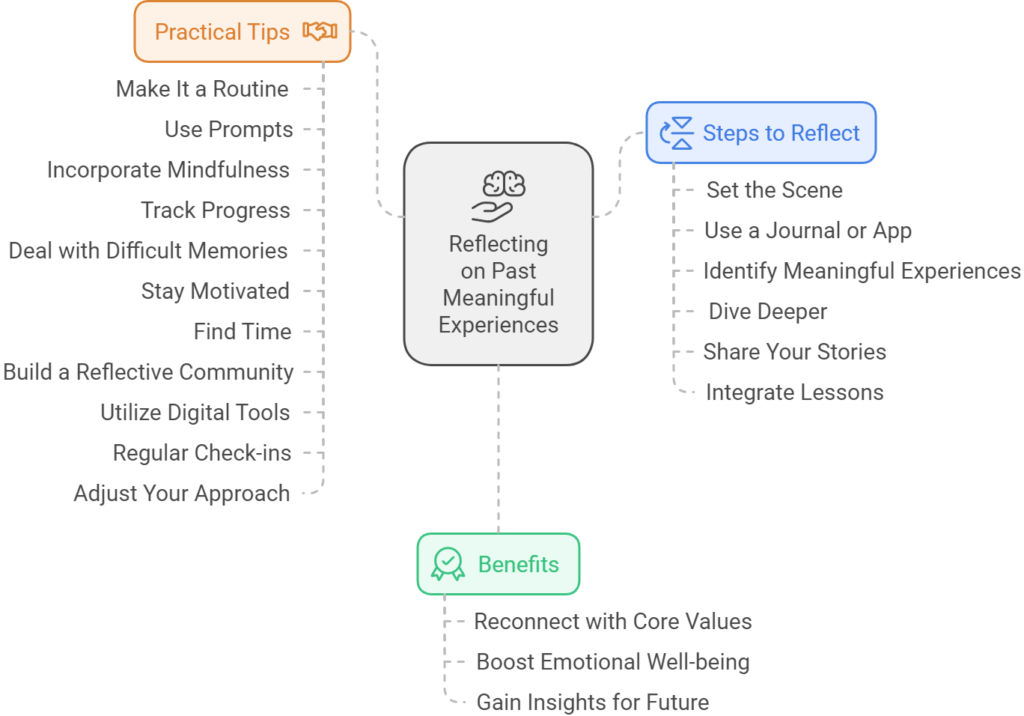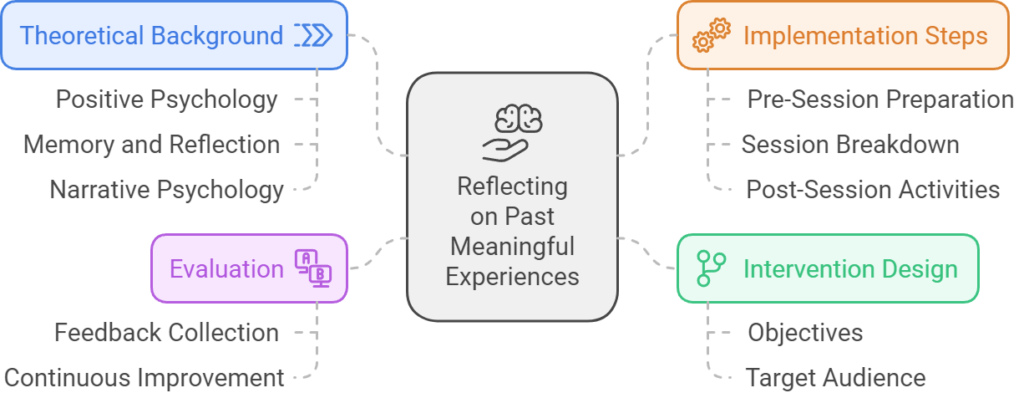Feeling disconnected from past achievements and experiences that once brought you a sense of joy and purpose is more common than you might think. This guide aims to help you rediscover those meaningful moments and integrate the essence of those experiences into your daily life to boost your overall well-being, motivation, and happiness. Let’s walk through how you can make this a regular part of your life.

Why Reflect on Past Meaningful Experiences?
Understanding the Benefits
Reflecting on past meaningful experiences can help:
- Reconnect you with core values and strengths.
- Boost emotional well-being and provide a sense of purpose.
- Offer insights that can be applied to current and future life challenges.
The Role of Memory in Shaping Identity
Memory isn’t just about recalling events; it’s about understanding how those events shaped who you are today. Reflecting on these memories can help you rediscover parts of yourself that you may have forgotten.
The Power of Stories
Everyone constructs their identity through stories. By recalling and sharing meaningful experiences, you can reshape your life story to emphasize growth, resilience, and fulfillment.
How to Start Reflecting on Past Meaningful Experiences
Step 1: Set the Scene for Reflection
Find a quiet, comfortable place where you can think without interruptions. This could be a cozy corner of your home, a favorite park bench, or even a quiet cafe. The environment should make you feel relaxed and undistracted.
Step 2: Use a Reflection Journal or Digital App
Having a dedicated place to write down your thoughts can be incredibly helpful. Whether you prefer a physical journal or a digital app, use it to record your reflections. Some good digital options include journaling apps like Day One or even a simple notes app on your phone.
Step 3: Identify Meaningful Experiences
Think about significant moments in your life that brought you joy, satisfaction, and a sense of purpose. These could be anything from achievements at work, personal milestones, time spent with loved ones, or even smaller moments that made a big impact.
Step 4: Dive Deeper into These Experiences
Choose one experience at a time to explore in more depth. Reflect on the circumstances, emotions, and values associated with it. Ask yourself questions like:
- What made this experience meaningful?
- How did it make you feel?
- What core values or strengths were involved?
Step 5: Share Your Stories
If you’re comfortable, consider sharing these experiences with others. This could be through a group, a trusted friend, or even an online forum. Sharing not only helps reinforce the positive emotions but also allows for new perspectives and insights.
Step 6: Integrate Lessons into Your Current Life
Think about how the essence of these past experiences can be adapted to enhance your current situation. For example, if a past achievement made you feel competent and valued, find ways to apply those skills in your current job or hobbies.
Practical Tips for Regular Reflection
Make It a Routine
Set aside dedicated time each week to reflect on past experiences. This could be a Sunday morning ritual or a midweek evening activity. Consistency is key to making this practice effective.
Use Prompts to Guide Your Reflection
Sometimes it can be hard to know where to start. Use prompts to guide your reflection. Here are a few to get you started:
- “Describe a time when you felt truly happy and alive. What were you doing?”
- “Think about a moment when you overcame a significant challenge. What strengths did you use?”
- “Recall a period when you felt closely connected to others. What made those relationships special?”
Incorporate Mindfulness Practices
Mindfulness can enhance reflection by helping you stay present and focused. Simple mindfulness practices like deep breathing or a short meditation can prepare your mind for deeper reflection.
Track Your Progress
Keep track of your reflections and any actions you take to integrate these experiences into your current life. This can help you see your progress over time and provide motivation to continue.
Overcoming Challenges
Dealing with Difficult Memories
Not every memory you reflect on will be positive. If you encounter difficult or painful memories, acknowledge them without judgment. You might find it helpful to talk to a mental health professional if these memories are overwhelming.
Staying Motivated
It can be easy to start strong and then lose momentum. To stay motivated:
- Set small, attainable goals for your reflection practice.
- Join a group or community for support and accountability.
- Remind yourself regularly of the benefits you’re seeking.
Finding Time
Life can get busy, but finding time for reflection is crucial. Consider incorporating reflection into other activities such as walks, commutes, or before bed. Even a few minutes each day can make a difference.
Creating a Supportive Environment
Building a Reflective Community
Encourage friends or family members to join you in this reflection journey. Sharing experiences and insights can strengthen relationships and provide mutual support.
Utilizing Digital Tools
There are many apps and online platforms designed to facilitate reflection and sharing. Consider joining an online group dedicated to personal growth and well-being.
Evaluating Your Progress
Regular Check-ins
Set aside time every month to evaluate how your reflection practice is impacting your life. Are you feeling more connected to your past? Are these reflections helping you in your current life?
Adjusting Your Approach
Based on your evaluations, adjust your approach as needed. If something isn’t working, try a different prompt or a new environment. The goal is to find what works best for you.
Conclusion
Reflecting on past meaningful experiences is a powerful way to enhance your quality of life. By regularly engaging in this practice, you can reconnect with your core values, boost your emotional well-being, and find new ways to apply the wisdom of your past to your present and future. Start small, stay consistent, and watch how your life transforms.
